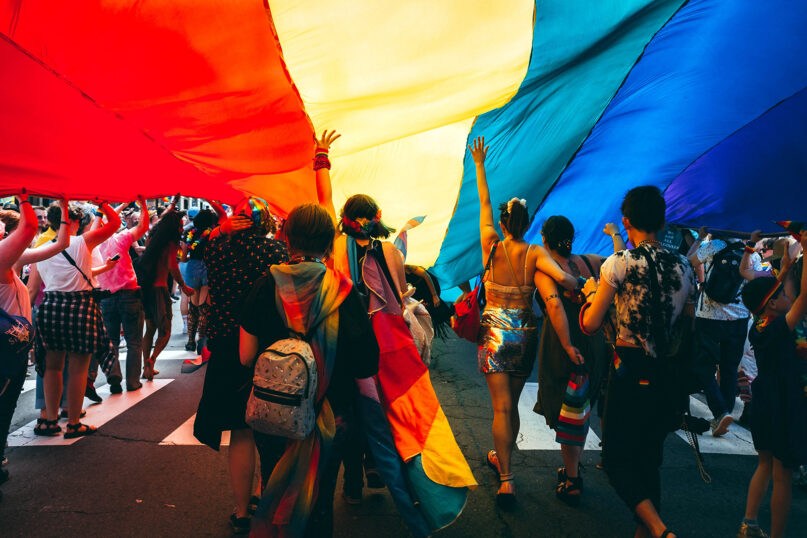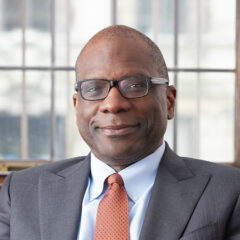‘No false choices’: Why we don’t decide between faith and LGBTQ+ rights
Vice President Harris named a truth I know through both my work and my living.

(RNS) — In my brief conversation with Vice President Kamala Harris at a Pride event she and second gentleman Douglas Emhoff hosted at their Washington residence last week, I told her that a significant percentage of students I serve at Union Theological Seminary, if not a majority, are LGBTQ+. The vice president seemed genuinely surprised and pleased. After a moment’s pensive consideration, she responded, “It just proves there are no false choices.”
Her words have continued to reverberate in the days since the event. They name a truth I know through both my work and my living: We don’t have to choose between faith, spirituality or religion and a fully embodied sexuality.
For too long, cultural consensus has held LGBTQ+ identity and religious belonging to be mutually exclusive. It’s not infrequent to see newspaper headlines proclaiming “conflict between LGBTQ+ rights and faith voters” — as if many LGBTQ+ people do not love God and millions of cis-heterosexual religious people don’t believe their spiritual tradition calls them to embrace their LGBTQ+ neighbors.
Indeed, when policymakers, faith leaders and activists attempt to force a choice between “religion” and “LGBTQ+ rights,” it is actually a choice between abusive religion and healthy sexuality. For far too long, hateful voices have contorted and twisted religious texts to demonize LGBTQ+ people. They’ve weaponized religion to pursue their own far-right agenda.
In sum, the widely held dichotomy between faith and sexuality is not the product of innate and irresolvable tension; it’s the consequence of hatred masquerading as faith.
What I also deeply appreciate about the vice president’s remark is how, in just a few words, she creates space for the breadth and depth of religious and spiritual expression and practice in the United States. Religious pluralism is one of our greatest defenses against the ascendant Christian nationalism that presently drives far-right forces. Interreligious coalitions can uproot the myth that the U.S. was founded as a Christian nation.
In my own city of New York, I watch Christian, Jewish, Muslim, Buddhist and Hindu communities — and so many others — work beside atheist and agnostic neighbors to advocate for policies that promote universal thriving.
Sadly, that kind of collaboration rarely makes headlines, while Christian nationalists are often given airtime and column inches to speak as though they alone define “religious concerns.”
The millions of faithful Americans who believe God calls us to mutual respect must get louder about the religious values that motivate our interdependence. We cannot let the most bigoted and negative perspectives define faith in the public square.
Ultimately, what I also hear in Harris’ simple sentence is the grace that has defined my own life; my own marriage to my husband, Michael; and the beautiful lives of so many LGBTQ+ people I know. Healthy sexuality and sexual expression and identity coupled with healthy spirituality is a well of love and compassion that flows in abundance from our living.
I watch LGBTQ+ students at Union Seminary, LGBTQ+ clergy who faithfully serve their communities and LGBTQ+ people filling pews in congregations throughout the country and I see God’s radiance reflected back at me. It’s the embodiment of the truth I read in the Bible, “We are fearfully and wonderfully made.”
What’s doubly beautiful is that all of these people are living and transforming religious communities despite the long history of theologies telling us we have no place. We heard voices telling us, “You are not welcome,” and proclaimed our own belonging and belovedness because we heard God’s voice tell us clearly that we are. That kind of radical love transforms communities. It’s the reason more and more faiths are changing their policies to bless same-sex marriages and ordain LGTBQ+ people.

The Rev. Frederick Davie. (Courtesy photo)
When you see this beauty firsthand, it exposes homo- and transphobic lies. “There are no false choices” — just a love that can heal what bigotry has broken. It’s love that can heal a fractured nation, too.
(The Rev. Frederick Davie, formerly the executive vice president of Union Theological Seminary, is senior strategic adviser to the president at the school. The views expressed in this commentary do not necessarily reflect those of Religion News Service.)

No comments:
Post a Comment